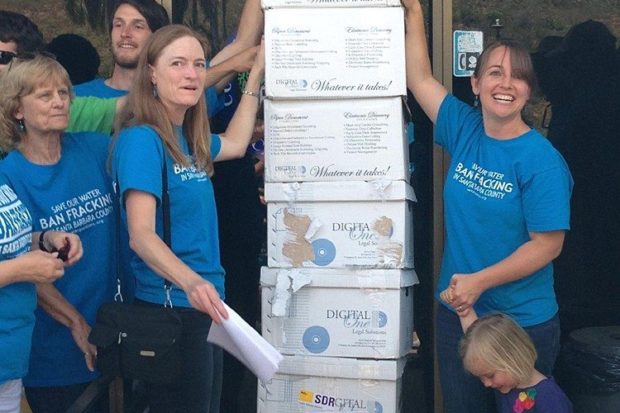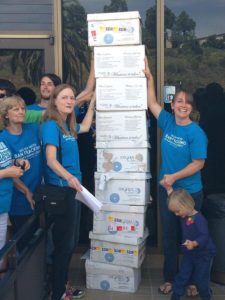
By Grant Marcus

California is experiencing a drought like it has not seen in more than 500 years. High-intensity, high-pressure modern drilling uses tons of sand, unnamed chemicals and industrial acids, which require millions of gallons of added freshwater every year at each well site. This water becomes polluted waste, unfit for farming, human consumption or anything else. Soon, we may “have to choose between food and 30 weight,” says Jim Fleck, who thinks fracking is ridiculous in a drought-driven state, inflamed by climate change.
Air quality is also affected. Modern techniques industrialize the old conventional process. More holes are welled, more pipe is laid, new roads are cleared, more complex platforms are built, more land is required for both horizontal and vertical drilling, and 200 trucks are often used per site taking water and wastewater, equipment and chemical sand to and from the site, causing logjams. Natural gas is burned off or “flared,” sending particulates and methane into hotter and hotter climate-changed air.
Meanwhile, Halliburton and other oil companies are fracking off the coast in federal waters in the Santa Barbara Channel. They are some of the same companies that have caused disastrous oil spills in the Gulf, the Middle East and off the coast of Brazil. Along with their ominous track records, they are already dumping millions of gallons of fracked waste back into the channel, jeopardizing wildlife and the fishing industry. The Environmental Protection Ageny (EPA) has given its approval for the Pacific to be a dumpsite.
There is also the issue of radiation. Shale rock contains radon, and when gas within it is flared or burned off, radioactive particulates are released. Radon is also released into the water table when shale is pulverized by chemicals and their interactive implosions beneath the earth’s surface. A Fukushima-like nightmare could be brewing under the ground, toxifying our water supply.
One big reason we are fracking is because Big Oil has spent $126 million lobbying the last 15 years and $56.3 million in Sacramento in the last four years, or $417,000 per legislator. The result is the oiling down of SB4, modified 10 times, with the Western States Petroleum Association approving every change. State Senator Fran Pavley (D–Agoura Hills) calls it a “strong environmental bill,” but the Los Angeles Times is more honest, describing it as “useless?”
The upcoming “moratorium on fracking” fares no better. Both “environmental bills,” in their current forms, will not monitor modern-day drilling until environmental impact reports come out on fracking mid-2014 to the beginning of 2015. By then, thousands of wells could be fracked with inferior oversight, such as what we’re seeing in Wasco.
The U.S. Department of Agriculture requires pharmaceutical companies to go through rigorous years of testing and the naming of all ingredients. So why are oil companies allowed to dump unnamed chemicals into our drinking water with impunity? And many of these chemicals, because of thousands of leaks, have been identified as carcinogens.
Bob Field, former Valley planner and now director of the Santa Ynez Rancho Estates Mutual Water Company, says, “If it’s unlawful for a chemical to be used in groundwater, why then is it lawful to inject it in the ground?” Field knows, like many environmentalists, that chemicals put in the ground will leach into the water table. For some of these industrial solvents, scientists are estimating as soon as three years.
When asked if the water could be treated or filtrated, Field responded, “We wouldn’t even know what to treat, or how to treat, because we aren’t allowed to know what those chemicals are.”
If we are not to believe environmentalists, or even people in the business of water, maybe we should believe Louis Allstadt. Allstadt served with Mobil Oil for 31 years, was vice president of the company and western regional director of projects here, including fracking. Allstadt has condemned fracking, stating, “Making fracking safe is simply not possible, not with the current technology, or with the inadequate regulations being proposed.”
We do have a choice. Germany has gone from zero to 25% solar electric in just 10 years by using rooftop photovoltaic cells. We have more land and get twice as much usable sunlight as Germany. And so California could be 50% solar in no time. But Big Oil, acting like industrial dinosaurs, would rather spend millions squeezing every last drop of dirty tar sands oil out of our state, no matter the consequences.
Allstadt sees the light: In a letter to ExxonMobil’s new CEO, Allstadt recommends that “it is time Exxon-Mobil started shifting away from oil and gas, and toward alternatives.” Swift action might be better than the talk of “shifting.” Maybe a campaign is needed: “Don’t be a dinosaur, go solar.”
If people inside the industry are questioning domestic drilling techniques and demanding alternatives, it shows the uncertainty of new methods as well as the urgency of our predicament. The oil executive thinks a climate and water crisis requires a change in direction. Perhaps conservatives—if not everyone—should too.
What Fresno has in common with Santa Barbara, Los Angeles and Ventura County is the Monterey Shale Formation, where all this new drilling is considered the next “California goldrush with potential for unlimited profits.” But what good is profit if there is no quality to our lives?
I hope Fresno County will follow the footsteps of the City of Los Angeles’ 10-0 vote to ban fracking, the ban by Beverly Hills and the latest success in Santa Barbara to place a “ban on fracking” measure on the ballot. Fresno cannot afford to wait for local politicians, pressured by oil companies, to do its bidding. Each of us must step to the plate.
It is emergent we ban all modern, unconventional drilling technologies abusing water and energy and affecting our environment, the quality of our water and the quality of our air, while exacerbating climate change. Dr. Catherine Gautier, professor emeritus with the geography department at the University of California at Santa Barbara and coauthor of a recent academic book on fracking and gas extraction, says, “Of all the things we can do locally in regard to climate change, this ban (on fracking, acidification and steam injection) would have the highest impact and is critically important at this time.”
The water guardians have more clout and can take their cause to the Board of Supervisors for a quick vote rather than a costly election.
Meanwhile, California is in both a climate and water crisis. We have only a window of opportunity to act if we want to ensure quality lives for future generations, or our children. And so, we must open that window and do it now.
*****
Grant Marcus, RN, ME, lives in Ventura. Contact him at 805-259-9725 or grantpeacenurse726@gmail.com.
